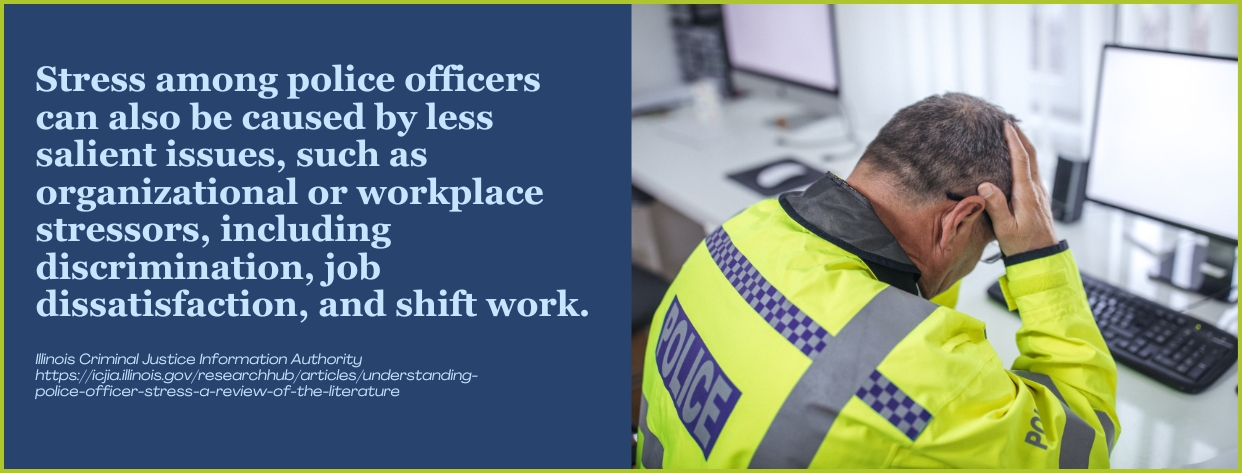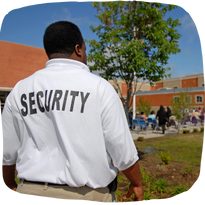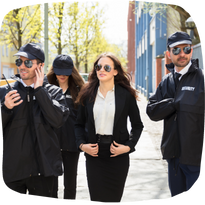Find Your Perfect School
Being a law enforcer is one of the noblest jobs in the world. Law enforcement careers are some of the highest-paying professions, with a median salary of $69,160 as of May 2022, according to the Bureau of Labor Statistics. However, it takes a lot of passion for someone to put their life on the line daily to protect others, uphold the law, and maintain peace and order.
Not all policemen and women stay in the law enforcement field for a long time, though. Some may want to transition and become police officers; a career change for personal and professional reasons.
If you’re like many law enforcement officers who are considering venturing into a new career path in private or government agencies, you must explore your options carefully. Conducting research, assessing your transferable skills, and determining your personal and professional goals also make a difference!
While it can be daunting to leave years of hard work, it can also be exciting for law enforcement professionals to discover new passions, interests, and skills.
Check this out: Great Career Changes for Lawyers
Excellent Career Changes for Law Enforcement
Crime Scene Investigator
As a law enforcer, you have undoubtedly dealt with crime scenes and have firsthand knowledge of the intricacies of gathering and analyzing evidence. This experience could prove invaluable if you decide to pursue a career as a crime scene investigator.
- Collecting and analyzing physical evidence, such as fingerprints, DNA, and fibers. Your law enforcement experience would have equipped you with the knowledge and skills necessary to handle evidence carefully, preserve its integrity, and document its chain of custody.
- Processing the crime scene to gather information and evidence. You already know the importance of thoroughness and attention to detail in investigating a crime scene.
- Conducting interviews with witnesses and suspects to gather information about the crime. Your experience as a police officer has helped you develop the ability to ask relevant questions, identify statement inconsistencies, and interpret nonverbal cues.
- Writing detailed reports of your findings and presenting them in court. As a law enforcer, you have experience in report writing and testifying in court, which are both essential in a crime scene investigation.
The following are important requirements for those aspiring to become a crime scene investigator:
- A strong foundation in science, especially in fields such as biology, chemistry, and physics, as this knowledge is fundamental in understanding and analyzing physical evidence.
- Good analytical skills to identify, collect, and interpret evidence.
- Excellent attention to detail and the ability to stay organized, as the work of a crime scene investigator can be demanding and time-sensitive.
- Good communication skills to work with law enforcement agencies, witnesses, attorneys, and juries.
- A bachelor’s degree in Forensic Science or a related field, although some agencies may accept a combination of relevant experience and education.
Cyber Security Analyst
The role of a Cyber Security Analyst is to protect businesses and organizations from cyber threats by monitoring, detecting, and responding to potential attacks. Surprisingly, being a law enforcer can make you an excellent fit for this role. Here’s why:
- Knowledge of investigative techniques, such as gathering evidence and analyzing data, is invaluable when identifying and responding to potential cyber threats.
- Attention to detail to analyze data and detect anomalies indicating a potential threat.
- Analytical skills to understand and process data and develop strategies to prevent cyber-attacks.
- Ability to work under pressure and make critical decisions quickly.
- Familiarity with regulations to ensure that your organization complies with regulations, such as the General Data Protection Regulation (GDPR).
- Collaboration skills to work with a team to achieve your objectives.
To become a Cyber Security Analyst, you’ll need the following:
- A bachelor’s degree in Cyber Security, Computer Science, or a related field
- Experience in IT or Cyber Security
- Knowledge of cybersecurity tools and technologies
- Familiarity with regulations and compliance requirements
- Excellent problem-solving skills
- Ability to work under pressure and make critical decisions quickly
Forensic Accountant
Forensic accountants are responsible for investigating financial crimes and analyzing financial data to support legal cases. Their work can help law enforcement agencies solve financial crimes like fraud, embezzlement, and money laundering.
Here’s how you can leverage your experience to become a forensic accountant:
- Analyzing financial data – analyze complex financial data to identify inconsistencies or suspicious activities.
- Identifying financial discrepancies – have a keen eye for details to identify discrepancies in financial statements or transactions.
- Conducting investigations – work with law enforcement agencies to conduct investigations and understand legal procedures.
- Providing expert testimony – have strong communication skills and the ability to present complex information clearly and concisely.
To become a forensic accountant, you need to possess the following:
- A degree in Accounting, Finance, or Business Administration.
- Experience in accounting, auditing, or financial analysis.
- In-depth knowledge of forensic accounting tools and methodologies.
- Robust analytical and problem-solving skills.
- Impeccable communication and presentation skills.
Fire Inspector
A fire inspector plays a critical role in the prevention of fires and the safety of a community. They inspect buildings and properties to ensure they meet fire safety regulations and investigate the cause of fires.
Those with a background in law enforcement have unique skills that make them excellent candidates for this profession.
- Paying close attention to details to identify potential fire hazards and ensure that buildings comply with fire safety regulations could mean the difference between life and death in an emergency.
- Determining the origin and cause of a fire, which requires gathering evidence, interviewing witnesses, and analyzing information, is crucial in this role.
- Communicate effectively with building owners, firefighters, and other stakeholders to ensure buildings are safe and compliant with regulations.
- Leading teams effectively and making informed decisions in emergencies.
To become a fire inspector, you must have the following:
- High school diploma or equivalent, although some employers may require a degree in Fire Science or a related field.
- Training and certification in fire inspection or investigation.
- Experience in firefighting, law enforcement, or a related field.
- Strong communication, investigative, and leadership skills.
- Physical fitness, as fire inspectors may need to climb ladders or carry heavy equipment.
Fraud Investigator
Fraud investigators are responsible for examining fraudulent activities, such as embezzlement, money laundering, and identity theft. If you have experience in law enforcement, it can prepare you well for a career in fraud investigation. Here are some reasons why:
- Law enforcement background: As a law enforcement officer, you have experience dealing with various criminal activities, from drug offenses to violent crimes. This background can help you identify patterns and behaviors that may indicate fraudulent activities.
- Investigative skills: Being previously part of the police force means you have experience conducting investigations, interviewing witnesses, and gathering evidence to establish a chain of evidence to prove a case is fraudulent.
- Knowledge of legal procedures: Law enforcement officers are familiar with legal procedures and regulations. In a fraud investigation, understanding the law is essential when gathering and presenting evidence in court.
- Analytical skills: Fraud investigators must have strong analytical skills to review financial records and identify discrepancies. You also need to analyze information and make connections between seemingly unrelated pieces of evidence.
To become a fraud investigator, you will need the following:
- A degree in Criminal Justice and a bachelor’s or master’s degree in Accounting.
- Relevant experience in law enforcement or a related field.
- Analytical and critical thinking skills to analyze financial records, identify patterns, and evaluate evidence.
- Strong communication and interpersonal skills to communicate effectively with clients, witnesses, and law enforcement officials.
- Attention to detail and the ability to work under pressure to manage multiple tasks and deadlines simultaneously.
- Association of Certified Fraud Examiners (ACFE) membership is essential to advancing your career.
School Security Director
Former police officers can use their knowledge and experience in keeping the public safe to provide security and protection to students and faculty members in K-12 schools. You can manage a school district’s security guard detail and safety program and work with emergency responders, law enforcement agencies, and school administrators.
Here are some of the duties of a School Security Director and how your experience as a law enforcer can prepare you for this role:
- Developing and implementing security policies and procedures to maintain a safe and secure environment. As a law enforcer, you deeply understand security protocols and strategies that can be applied to school security. You have also learned to assess risks and vulnerabilities and develop effective mitigation plans.
- Managing and supervising security personnel and ensuring they are properly trained and equipped to handle emergencies. You will lead teams and provide guidance and support to achieve common goals. You also need to be an expert in crisis management and emergency response.
- Coordinating with law enforcement agencies and other stakeholders to address security issues and maintain a safe and secure environment. You will also need to communicate effectively and collaborate with others to achieve common objectives.
- Conducting security assessments and audits to identify vulnerabilities and develop mitigation plans. Being a former police officer means you have experience conducting investigations and analyzing data to identify patterns and trends. You have also learned how to document and report findings, which is important in this role.
These are the requirements to become a School Security Director:
- Strong leadership and communication skills to manage and motivate security personnel and coordinate with other stakeholders.
- Good analytical and problem-solving skills to assess risks and vulnerabilities and develop effective security plans.
- Excellent organizational skills and the ability to manage multiple tasks and projects simultaneously.
- The ability to work under pressure and make decisions quickly and effectively.
- A bachelor’s degree in Security Management, criminal justice, or a related field, and experience in law enforcement or security.
Correctional Officer
A career as a correctional officer is an excellent choice for those who want to venture into a new profession but still want to be part of the law enforcement field. The role of a correctional officer is to maintain the safety and security of correctional facilities and ensure that inmates are treated with respect and dignity.
Here are some more responsibilities you’ll need to fulfill as a correctional officer:
- Knowledge of laws and regulations: As a law enforcer, you have gained knowledge of the laws and regulations that govern the criminal justice system. This same knowledge is crucial for correctional officers, who must ensure that the rights of inmates are protected while also enforcing the rules and regulations of the facility.
- Experience with conflict resolution: Correctional officers will often face challenging situations requiring quick thinking and effective conflict resolution skills to de-escalate tense situations and maintain order in the facility.
- Ability to work in high-stress environments: Law enforcement is known for its high-stress environments, and correctional officers face similar stressors. They work in a potentially dangerous environment and must remain calm and composed under pressure.
- Strong communication skills: Communication is critical for both police agents and correctional officers. They must communicate effectively with inmates, fellow officers, and other staff members to maintain order and safety within the facility.
- Ability to enforce rules and regulations: Law enforcers are responsible for upholding the law, and correctional officers are no different. They must be able to enforce the rules and regulations of the facility while also ensuring that inmates are treated fairly and with respect.
These are what you need to accomplish to become a correctional officer:
- Strong interpersonal skills to interact with inmates and colleagues effectively.
- The ability to work in a team and follow orders from superiors.
- Excellent observation and analytical skills to identify potential security risks.
- Physical fitness and the ability to pass a fitness test.
- A high school diploma or equivalent and completion of a training program.
- A bachelor’s degree in Criminal Justice, social science, or other related fields.
Victim Advocate
Victim advocates provide support, assistance, and resources to victims of crime. Their primary objective is to help victims navigate the criminal justice system and cope with the aftermath of a crime.
While the role of a victim advocate is often associated with social work, former police officers looking for a career change can make excellent candidates because of these reasons:
- A deep understanding of the criminal justice system, including the arrest, charging, and sentencing process, is helpful when advocating for victims and helping them navigate the legal system.
- Knowledgeable of victim rights, including the right to be heard, the right to restitution, and the right to be informed about the status of the case, ensuring that victims are not re-victimized by the criminal justice system.
- Crisis management skills involve responding to emergencies and providing support to victims who may be experiencing emotional trauma and require immediate assistance.
- Empathy and compassion for those you serve, supporting victims of crime who may feel vulnerable and overwhelmed.
These are what you need to become a victim advocate:
- Strong communication and interpersonal skills to communicate effectively with victims, law enforcement personnel, and other professionals involved in the case.
- A basic understanding of victim services, including counseling, legal assistance, and advocacy, is essential for a career as a victim advocate.
- The ability to work independently, managing their caseload and schedule.
- A degree in Social Work, criminal justice, or a related field, as well as certification or licensing to work as a victim advocate.
Probation Officer
If you have a passion for law enforcement and want to help individuals who have committed crimes rebuild their lives, becoming a probation officer might be the right career path.
These are the reasons why being a former police officer will make you a wonderful probation officer:
- Knowledge of the criminal justice system is invaluable for understanding the probation and parole process.
- Good communication skills to work with offenders, their families, and other stakeholders.
- Attention to detail, especially when supervising offenders.
- Skilled at remaining calm under pressure and making timely decisions.
- Critical thinking skills to assess and evaluate offenders’ behavior to determine the appropriate action and resolve cases.
Below are the things you need to accomplish to become a probation officer:
- A bachelor’s degree in criminal justice, psychology, or a related field.
- Proficiency in interpersonal communication and the ability to establish rapport with diverse groups of people.
- Aptitude for functioning independently while also being a productive team player.
- Excellent analytical and critical-thinking abilities.
Bodyguard
Being a bodyguard requires strength, quick reflexes, and a sharp mind. However, if you have a background in law enforcement, you may have the right skill set to become an excellent bodyguard.
Here are some reasons why your experience as a former law enforcer can help you become a professional bodyguard:
- Rigorous physical training to develop the physical stamina needed to be a bodyguard.
- Constant awareness of your surroundings to ensure their safety and the safety of others and assess potential threats and respond quickly.
- Extensive training in combat and self-defense techniques to protect your client.
- Comprehensive training in the use of firearms to ensure you’ll be able to protect your client from an armed assailant.
To become a bodyguard, you need to possess the following:
- A calm and level head to be able to think clearly and respond appropriately in a high-stress situation.
- Excellent communication skills to communicate effectively with your client and the rest of the security team.
- A background in law enforcement, military, or security services can be advantageous.
Final Thoughts
Former law enforcers have a unique set of skills and experiences that can translate well to a variety of different career paths. Whether it’s due to a desire for a change of pace or a need to pivot in response to changing life circumstances, many former police officers find themselves exploring new career opportunities.
With your intensive knowledge and experience in leadership, problem-solving, and critical thinking, you may be well-suited for security, investigations, or private security consulting careers. However, transitioning to a new career path can also present challenges, and it’s important for former members of the law enforcement field to carefully consider their goals and aspirations before making a change.
Want to know more? See: The Best Online BS in Legal Studies Degrees
The Best Bachelor’s in Criminal Justice and Legal Online Schools and Career Guide











